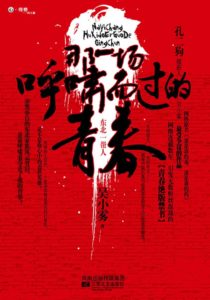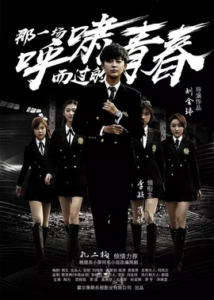Only the Wind Knows
那一场呼啸而过的青春
China, 2017, colour, 2.35:1, 108 mins.
Director: Han Tian 韩天.
Rating: 7/10.
Student rom-com/drama, set in 1996 in the rough northeast, is well written and engagingly played.
Tiexi, Heilongjiang province, northeast China, late 1996. Brawling tomboy Yang Beibing (Bu Guanjin), 18, daughter of a divorced factory manager-turned-restaurateur, is in her second year at Tiexi Technical Training School. One day she leads a group of 12 other girls in a revenge attack on some boys in a men’s bathhouse after the latter insulted some girls by the reservoir. Yang Beibing is especially after cheeky layabout Bai Yuzhou (Qu Zheming); but while fighting in the bathhouse she comes across her childhood friend and fellow student Yu Yi (Liu Chang), whom she berates for not helping her. Waiting outside, the other girls steal the boys’ clothes, forcing them to run naked down the street. Yu Yi is studying computing, and is a prize-winning pupil. Yang Beibing realises she’s actually in love with him, though Yu Yi looks upon her as just a good friend. After both of them fight Bai Yuzhou outside the school one day, and then escape on a motorbike, Yu Yi is knocked unconscious and Yang Beibing, thinking he’s dying, gives him the kiss of life – her first ever kiss with a boy. That night the two go drinking at a big new disco club, Little Hong Kong, where Yu Yi, whose parents have been laid off work, tries to get a job as a barman. After initially being refused, he’s helped when Yang Beibing is recognised by the owner, Lei Guan (Huang Jue), who respects her father, Yang Jun (Zhao Xiaochuan), who was a manager at the factory where Lei Guan once worked. Back home, Yang Beibing’s father warns her that Lei Guan is not all he pretends to be, but she won’t listen as Yu Yi’s new job now makes him and her inseparable. One night, after tricking Yu Yi out on a “date”, he mentions that he really likes a transfer student in the year above, called Ziwei (Li Meng), who’s the lead singer in the choir he attends. Yang Beibing hides her disappointment, and the same night the two of them by chance rescue Lei Guan from being killed by a rival businessmen because he’s started a gambling club in Little Hong Kong’s basement. Yang Beibing initially tries to bully Ziwei, but the latter holds her ground and insists she’s not interested romantically in Yu Yi. The two girls become friends. Gradually Yang Beibing realises Lei Guan is, in fact, a ruthless gangster, especially when she finds him and his men beating Bai Yuzhou to a pulp for making a mistake in a debt-collecting job. Then one day, outside the school, an anonymous poster appears saying Ziwei was raped while at high school in the south. As Ziwei is ostracised, Yang Beibing and Yu Yi become her only friends. But then suddenly Ziwei vanishes.
REVIEW
With its well-drawn characters, atmospheric setting and coming-of-age undertow, Only the Wind Knows 那一场呼啸而过的青春 is a superior student rom-com that just trips slightly at the end with a coda that adds nothing. Set some 20 years ago in China’s rough, tough northeast at a time of economic change and unemployment, it was the first solo directorial outing by Beijing-born film-maker Han Tian 韩天, then 32, after Waiting by the Lake 山水驿栈 (2012, co-dir. Zhou Wencao 周文操) – a low-budget comedy centred on a stuggling writer – plus TV and online drama series. The film made only a tiny impression at the box office (RMB9 million) but Han has since gone on to make the contemporary rom-com My Love 你的婚礼, so far unreleased. [It was released in spring 2021.]
 Thinly based on a 2009 novel by Wu Xiaowu 吴小雾 (see cover, left), Wind had its thunder stolen a few months earlier by an online TVD series of the same Chinese name, set in the present in Guangdong and directed by Liu Quanwei 刘全玮 (see poster, below left), which may partly explain the film’s disappointing box office. Both works centre on a tomboyish character; but Han’s film is set in a pre-mobile phone age, amid the smoke stacks and iron factories of the northeast, and at a no-name technical college (rather than a spiffy university) for losers. It’s the age of the walkman, call pagers (for those who can afford them), and when Hong Kong/Taiwan pop culture still ruled Mainland teenagers’ lives. It’s not an original setting but Han, along with a strong cast and a well-worked script co-written by Jiao Tingting 焦婷婷 (with whom he’d done the online TVDs Long Time No See 匆匆那年 好
Thinly based on a 2009 novel by Wu Xiaowu 吴小雾 (see cover, left), Wind had its thunder stolen a few months earlier by an online TVD series of the same Chinese name, set in the present in Guangdong and directed by Liu Quanwei 刘全玮 (see poster, below left), which may partly explain the film’s disappointing box office. Both works centre on a tomboyish character; but Han’s film is set in a pre-mobile phone age, amid the smoke stacks and iron factories of the northeast, and at a no-name technical college (rather than a spiffy university) for losers. It’s the age of the walkman, call pagers (for those who can afford them), and when Hong Kong/Taiwan pop culture still ruled Mainland teenagers’ lives. It’s not an original setting but Han, along with a strong cast and a well-worked script co-written by Jiao Tingting 焦婷婷 (with whom he’d done the online TVDs Long Time No See 匆匆那年 好 久不见, 2015, and Suddenly Seventeen 28岁未成年, 2016), makes it count.
久不见, 2015, and Suddenly Seventeen 28岁未成年, 2016), makes it count.
The film starts gangbusters with a pacey sequence in which tomboy Yang Beibing (literally, “Northern-Ice Yang” 杨北冰) leads an angry female group into a male bathhouse and sets about teaching one of the naked boys a lesson in manners. Nothing in the rest of the film quite equals this opening for sheer energy and comic cheek, but it neatly sets up several of the main characters for the story to come. That story is thoroughly generic – tomboy falls for longtime male friend but keeps her feelings secret while he romances a glamorous fellow student – but sounds enough grace-notes to seem fresh. The riffs include the glam-girl and Yang Beibing becoming friends when the former makes it clear she’s not a threat, and a darker parallel story about a disco-club owner who is much more than he seems.
As this last character, the experienced Huang Jue 黄觉 (Falling Flowers 萧红, 2012; A City Called Macau 妈阁是座城, 2019) – not top-billed but the biggest name in the film – adds real heft to the drama below the youth rom-com, as a man who says he respects Yang Beibing’s father (and therefore has her respect) but is actually much more than he seems. One of the delights of the screenplay is how it develops separate threads for several characters and keeps them going alongside the main story: the always interesting actress Li Meng 李梦 (Young Love Lost 少年巴比伦, 2015; Dead Pigs 海上浮城, 2018; Vortex 铤而走险, 2019) here playing the glam-girl, and the lesser-known actor Qu Zheming 曲哲明, then in his first sizeable screen role as Yang Beibing’s nemesis, both benefit from this, carving textured parts of their own. Some roles, such as Yang Beibing’s pals, could have benefited from more expansion but that may have unbalanced the film, given the number of supporting roles.
As the male lead, and object of Yang Beibing’s suppressed desires, actor-model Liu Chang 刘畅, then 30, is less bland than he’d been in his movie debut, Les Aventures d’Anthony 陪安东尼度过漫长岁月 (2015), but is thrown into the shade by the dynamo playing of Bu Guanjin 卜冠今, 23, as the brawly Yang Beibing. Wuhan-born Bu (real name: Wang Huanhuan 王欢欢) had had a supporting role as a teacher’s daughter in the fine absurdist comedy Mr. Donkey 驴得水 (2016), plus leading roles in two online movies, but this was her first big-screen lead, and she attacks it with gusto, both physically and emotionally, while being equally convincing in quieter, more serious moments. Unfortunately she’s been largely swallowed up by TV ever since.
Despite being set in the mid-1990s, the script still finds time to prophesy (in a headmaster’s speech near the start) how important computer technology will become to China in the future. A more jarring note is struck, however, by the coda, set a decade later in Hong Kong, on the eve of the city’s Handover – which adds nothing and seems like a sop to audiences who need a more modern angle to a period story.
Production design for the main story is flavoursome and natural looking, enhanced by the unglossy widescreen photography of Zhou, co-director of Han’s first feature and d.p. of the superior coming-of-age drama Yesterday Once More 谁的青春不迷茫 (2016). Music placement is acute, nowhere less than in the use of the well-known song A Better Tomorrow 明天会更好, by Taiwan’s Luo Dayou 罗大佑, which accompanies the magical first appearance of Li Meng’s character as well as wrapping up the main story. It may be corny, but it works emotionally. The film was shot in and around the heavy-industry city Qiqiha’er, the second largest in Heilongjiang province, in China’s far northeast. The Chinese title means “That Youth (of Ours) That Whistled Past”.
CREDITS
Presented by Le Vision Pictures (Beijing) (CN). Produced by Le Vision Pictures (Beijing) (CN).
Script: Han Tian, Jiao Tingting. Novel: Wu Xiaowu. Photography: Zhou Wencao. Editing: Zhang Weili. Music: Mi Wenbo. Music supervision: Yu Fei. Art diection: Li Biao. Styling: Zhang Hongliang, Li Biao. Sound: Zhang Jian, Long Xiaozhu. Action: Zhao Donghe, Huang Zhenmo, Hu Lifeng. Visual effects: Li Zhiyong (Bud Vision). Executive direction: Zhang Hongwei.
Cast: Bu Guanjin (Yang Beibing), Liu Chang (Yu Yi), Li Meng (Ziwei), Qu Zheming (Bai Yuzhou), Li Zhengyanqi (Tang Xin), Aliya (Lele), Liang Hao (Ma Huifei), Wang Guanqi (Lao Si/Old Four), Wang Xinge (Wang Daxue), Zhao Xiaochuan (Yang Jun, Yang Beibing’s father), Huang Jue (Lei Guan), Feng Yandi (Zhao Guang), Chen Xu (Yu Yi’s mother), Shi Tiangeng (Yu Yi’s father), Niu Liwei (Ziwei’s stepfather), Wang Xiaoling (Ziwei’s mother), Sun Deyuan (college head), Zhang Yongfeng (bathhouse supervisor), Wang Yanfei (Liu Changhe, gangster), Na Xinwu (Han Shanyu, gangster), Zhao Yang (old worker friend of Yang Jun), Zheng Changsheng (gambler), Liu Weifeng (college teacher), Wu Bin (doctor), Lin Weilin (nurse), Wang Houguo (youngster), Ma Baozhen (security guard), Nicholas Beckwith (Yang Beibing’s boyfriend in Hong Kong).
Release: China, 5 Oct 2017.
